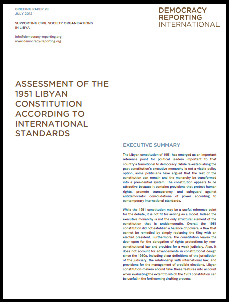Assessment of the 1951 Libyan constitution according to international standards, Democracy Reporting International - 2012

This briefing paper says the Libyan constitution of 1951 has emerged as an important reference point for political leaders important to that country’s transitional to democracy. While re-establishing the past constitution’s executive monarchy is not a viable policy option, some politicians have argued that the rest of the constitution can remain and the monarchy be ransformed into a presidential system. The constitution appears to be attractive because it contains provisions that protect human rights, promote transparency, and safeguard against antidemocratic consolidations of power according to contemporary international standards. While the 1951 constitution may be a useful reference point for the debate, it is not fit for serving as a model. Indeed the executive monarchy is not the only structural element of the constitution that is antidemocratic. Overall the 1951 constitution did not establish a balance of powers, a flaw that cannot be remedied by simply replacing the King with an elected president. Furthermore, the constitution leaves the door open for the abrogation of rights protections by nonconstitutional law and provides for a weak judiciary. Also, it does not account for advancements in constitutional design since the 1950s, including clear definitions of the jurisdiction of the judiciary, the relationship with international law, and provisions for the management of credible elections. Libyan constitution-makers should take these features into account when evaluating the extent to which the 1951 constitution can be useful in the forthcoming drafting process.